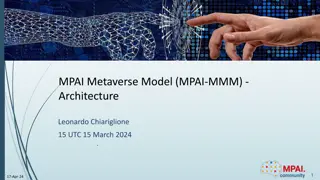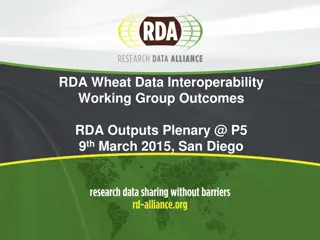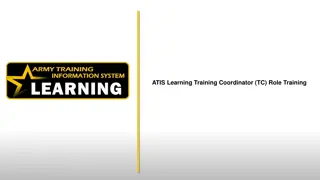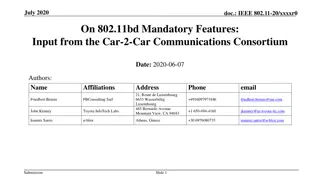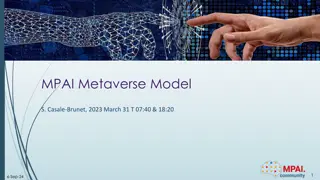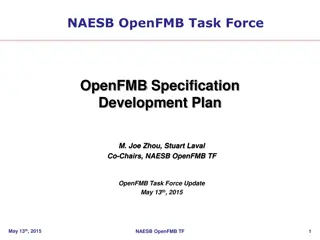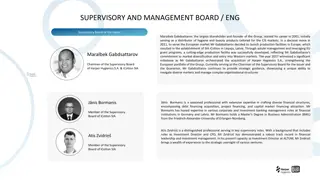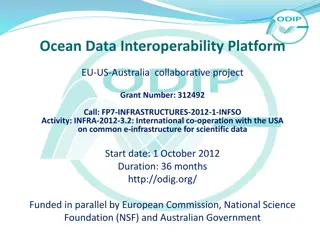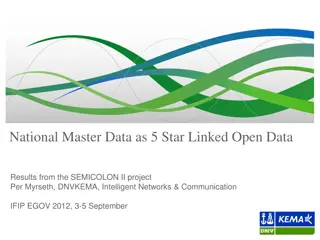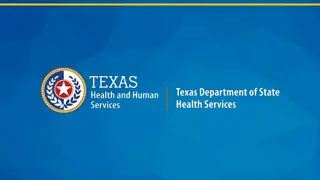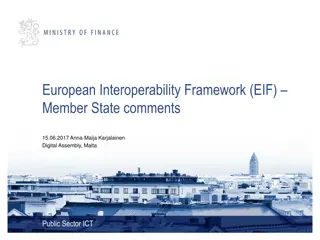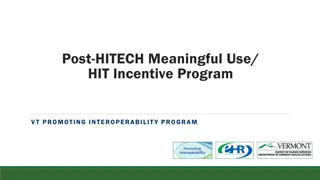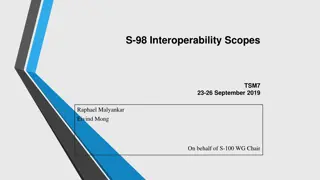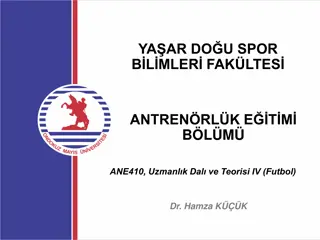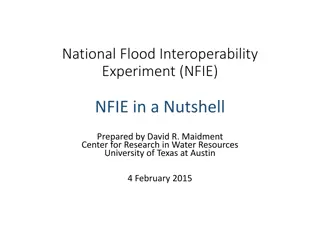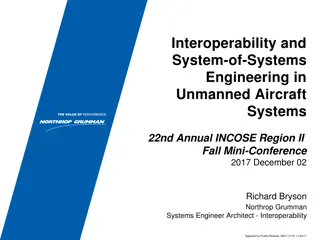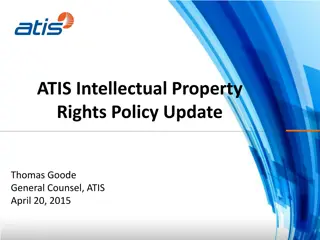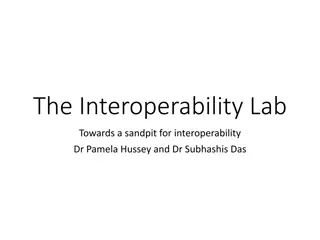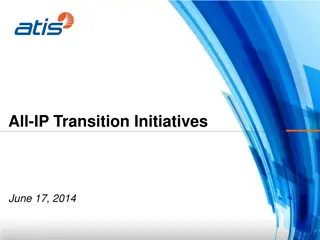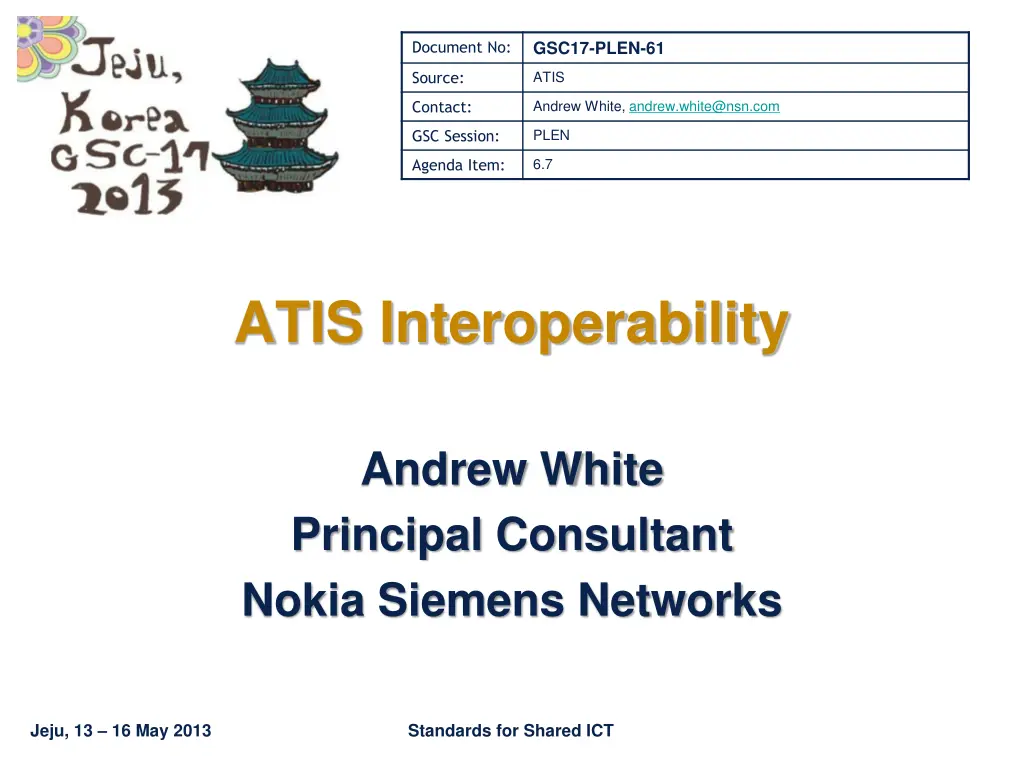
Standards for Shared ICT Activities in ATIS - GSC17 PLEN 61
Discover the latest activities in the ATIS standards development, including work on IP network interconnection, cloud services interoperability, rural call completion solutions, and device solutions initiatives. Stay informed about the advancements shaping the future of shared ICT standards.
Uploaded on | 1 Views
Download Presentation

Please find below an Image/Link to download the presentation.
The content on the website is provided AS IS for your information and personal use only. It may not be sold, licensed, or shared on other websites without obtaining consent from the author. If you encounter any issues during the download, it is possible that the publisher has removed the file from their server.
You are allowed to download the files provided on this website for personal or commercial use, subject to the condition that they are used lawfully. All files are the property of their respective owners.
The content on the website is provided AS IS for your information and personal use only. It may not be sold, licensed, or shared on other websites without obtaining consent from the author.
E N D
Presentation Transcript
GSC17-PLEN-61 Document No: ATIS Source: Andrew White, andrew.white@nsn.com Contact: PLEN GSC Session: 6.7 Agenda Item: ATIS Interoperability Andrew White Principal Consultant Nokia Siemens Networks Jeju, 13 16 May 2013 Standards for Shared ICT
GSC17-PLEN-61 Highlight of Current Activities ATIS Packet Technologies and Systems Committee (PTSC) Currently working to complete Phase 2 IP network- to-network interconnection (NNI) guidelines, including defining approaches for validating these guidelines. Developed a technical report (ATIS-1000053) that specifies the protocol profile, test suites and questionnaire for supporting Emergency Telecommunication Service (ETS) on IP-based NNIs. Testing occurred in January 2013. Results are being examined to determine if any modifications are necessary to ATIS deliverables. 2 GSC-17, Jeju / Korea GSC-17, Jeju / Korea Standards for Shared ICT Standards for Shared ICT
GSC17-PLEN-61 Highlight of Current Activities ATIS Cloud Services Forum (CSF) Significant value was realized from interoperability and interconnection testing of unified visual communications in the cloud in 1Q 2013. Although inter-provider interoperability testing has occurred in the past, this is the most comprehensive testing across an NNI between two providers to date. Initial findings are key to accelerate and extend incremental system-to-system testing. Opportunity to build on success of interworking of multiple providers/vendors by expanding participation. Proven results lead to broader adoption of IP services and promotion of IP-based interconnections. Plans are underway to expand on findings to standardize service interconnect. 3 GSC-17, Jeju / Korea GSC-17, Jeju / Korea Standards for Shared ICT Standards for Shared ICT
GSC17-PLEN-61 Highlight of Current Activities ATIS Next Generation Interconnection Interoperability Forum (NGIIF) Led a major effort to find solutions to challenges rural consumers and businesses faced in receiving long distance calls. Included participation from American rural telecommunications associations, rural carriers, major national service providers, state-level regulators, and the FCC. Resulted in the publication of the ATIS Intercarrier Call Completion/Call Termination Handbook, which provides best practices for carriers to troubleshoot call termination issues. ATIS currently participating in a joint national call completion task force to create a nationwide end-to-end test using pre-existing test tones. 4 GSC-17, Jeju / Korea GSC-17, Jeju / Korea Standards for Shared ICT Standards for Shared ICT
GSC17-PLEN-61 Highlight of Current Activities ATIS Device Solutions Activities Open Real-Time Communications API (ORCA) Open source project in support of WebRTC-enabled browsers Software (javascript) was generated first; any needed standards work will follow Other device-facing projects will follow ATIS Device Solutions Initiative (DSI) ORCA is the first project being launched under DSI Comprised of companies that want to influence direction of ORCA and how networks will evolve in support of edge devices Objective is enhanced value (increased service provider revenue) through new network-enabled services 5 GSC-17, Jeju / Korea GSC-17, Jeju / Korea Standards for Shared ICT Standards for Shared ICT
GSC17-PLEN-61 Strategic Direction ATIS will continue to promote interoperability via: Developing technical standards, and programs to inform industry about these standards Providing guidelines to facilitate interconnection Conducting interoperability tests Developing test suites Work with members to ensure: Device/Network interoperability (e.g., via ORCA) Network/Network interoperability (e.g., via Content Delivery Network Interconnection) Network/Service interoperability (e.g., via Telepresence, Text to 9-1-1, Commercial Mobile Alert System) 6 GSC-17, Jeju / Korea GSC-17, Jeju / Korea Standards for Shared ICT Standards for Shared ICT
GSC17-PLEN-61 Strategic Direction In parallel with its standards development activities, ATIS provides an open forum to facilitate discussion and resolution of the operational and interoperability issues necessary to effectively interconnect multiple service provider businesses. ATIS and its members have played, and will continue to play, a prominent role in FCC Advisory Committees on the topics of interoperability and interconnection. With the pace of change and the complexity of user needs and demands, ATIS will continue to actively evaluate how to best address interoperability, including: Device Integrity Cyber Security Software Defined Networks 7 GSC-17, Jeju / Korea GSC-17, Jeju / Korea Standards for Shared ICT Standards for Shared ICT
GSC17-PLEN-61 Challenges Companies that are first to market often become the standard. Consider Apple HTTP Live Streaming, which was developed outside of the typical standards process by a single company, and subsequently was distributed to the IETF for comments. Standards processes, while promoting interoperability, should also foster innovation, competition and infrastructure development that address user needs on a timely and cost-effective basis. The inclusion of options, ambiguities, etc., in standards make interoperability more difficult, but reflect the realities of consensus- development and the need for users to decide what features and capabilities meet their needs. Compliance with technical standards does not guarantee interoperability. 8 GSC-17, Jeju / Korea GSC-17, Jeju / Korea Standards for Shared ICT Standards for Shared ICT
GSC17-PLEN-61 Next Steps/Actions ATIS is continuing to develop needed standards and solutions, but are using market-driven techniques to do so. ATIS will continue to reach out to others to inform them regarding technologies, applications and their standards. ATIS will continue to partner with other PSOs and the ITU on efforts that effectively promote interoperability, innovation, competition, and cost-effective infrastructure deployment to address market needs on a timely basis. 9 GSC-17, Jeju / Korea GSC-17, Jeju / Korea Standards for Shared ICT Standards for Shared ICT
GSC17-PLEN-61 Proposed Resolution ATIS supports the reaffirmation of the existing Resolution (GSC-16/28) at this time. 10 GSC-17, Jeju / Korea GSC-17, Jeju / Korea Standards for Shared ICT Standards for Shared ICT
GSC17-PLEN-61 Supplemental Slides 11 GSC-17, Jeju / Korea GSC-17, Jeju / Korea Standards for Shared ICT Standards for Shared ICT
GSC17-PLEN-61 Additional Current Activities ATIS members continue to work with colleagues around the world to progress NGN interoperability through the development of interface and performance standards including in the ITU-T and 3GPP. The focus is on specifications on topics such as: Services Architecture Signaling Quality of Service Security Network Management Emergency Communications Identity Management 12 GSC-17, Jeju / Korea GSC-17, Jeju / Korea Standards for Shared ICT Standards for Shared ICT
GSC17-PLEN-61 Additional Current Activities ATIS Next Generation Interconnection Interoperability Forum (NGIIF) addresses next-generation network interconnection and interoperability issues associated with emerging technologies. Specifically, it develops operational procedures which involve the network aspects of architecture, disaster preparedness, installation, maintenance, management, reliability, routing, security, and testing between network operators. addresses issues which impact the interconnection of existing and next generation networks and facilitate the transition to emerging technologies. 13 GSC-17, Jeju / Korea GSC-17, Jeju / Korea Standards for Shared ICT Standards for Shared ICT
GSC17-PLEN-61 Additional Current Activities ATIS PTSC IP Interconnection (IPI) Subcommittee Similar to Circuit Switched networks, IP networks will interconnect using Network-to-Network Interfaces. In addition, IP networks will communicate with 3rd party Service Providers via either Application- to-Network Interfaces (ANIs) or Service-to-Network Interfaces (SNIs). The difference between ANI and SNI is that the SNI allows for the passage of media (e.g., content delivery, Interactive Voice Response (IVR)) in addition to signaling. In addition, there are User Network Interface (UNI) and other reference points in the ATIS architecture that will need to be validated. The PTSC IPI will lead and coordinate with other committees where appropriate on the following tasks: Define Standard Protocol Profiles for the NNI, ANI, SNI, UNI and other reference points. Define Interconnection Guidelines. Define Interoperability Test Suites. 14 GSC-17, Jeju / Korea GSC-17, Jeju / Korea Standards for Shared ICT Standards for Shared ICT
GSC17-PLEN-61 Additional Current Activities ATIS Cloud Services Forum (CSF) Promotes the integration of cloud technologies and network infrastructure to realize the significant benefits of cloud, by: Developing standards to enable the network to do more than it does today (e.g., expanding product offerings including services on demand, accelerating time-to-market, lowering costs, minimizing complexity, increasing scalability); Focusing on the creation of reusable Service Enablers to progress each phase of work; and Creating technical solutions in support of a global marketplace to help Service Providers realize cloud s full potential. 15 GSC-17, Jeju / Korea GSC-17, Jeju / Korea Standards for Shared ICT Standards for Shared ICT

